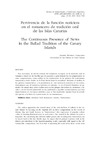Please use this identifier to cite or link to this item:
https://accedacris.ulpgc.es/jspui/handle/10553/58865
| DC Field | Value | Language |
|---|---|---|
| dc.contributor.author | Monroy Caballero, Andrés | - |
| dc.date.accessioned | 2019-12-16T20:46:22Z | - |
| dc.date.available | 2019-12-16T20:46:22Z | - |
| dc.date.issued | 2008 | - |
| dc.identifier.issn | 0034-7981 | - |
| dc.identifier.other | Dialnet | - |
| dc.identifier.other | WoS | - |
| dc.identifier.uri | https://accedacris.ulpgc.es/handle/10553/58865 | - |
| dc.description.abstract | Nos acercamos al estudio textual del romancero recogido en la tradición oral de Canarias a través de las huellas que la pequeña o gran historia ha ido perpetuando en estas composiciones, como reflejo de la continuación de la práctica del noticierismo romancístico desde finales de la Edad Media hasta la actualidad. Mediante el análisis de los géneros romancísticos y la persistencia de esta tendencia noticiera en los textos, demostramos que el romancero noticiero en Canarias —y en el mundo hispánico en general— ha estado muy activo (sobre todo en los pliegos dieciochescos, modernos y locales), con la función primordial de dar publicidad a aquellos acontecimientos que más impresionaron en una época pretérita y que se han mantenido vigentes hasta la actualidad gracias a la labor de conservación de sus transmisores. | - |
| dc.description.abstract | The author approaches the textual study of the oral tradition of ballads in the Canary Islands by focusing on the imprints left on these compositions by the events of History, Big and Small. Known as “Noticierismo”, this expression of popular culture —that of inserting historical news in such texts— has existed in the Islands for quite a long time. By considering the different ballad genres and revealing that noticierismo can be traced back to the late Middle Ages, he argues that its primary function, both in the Islands and elsewhere in the Spanish-speaking world, especially with regard to the 18th Century-like compositions, has been that of spreading the word about those events from the past which most impressed its practitioners. From one generation to the next, the centuries-old tradition has kept the memory of such events alive to the present day. | - |
| dc.language | spa | - |
| dc.relation.ispartof | Revista de Dialectologia y Tradiciones Populares | - |
| dc.source | Revista de dialectología y tradiciones populares [ISSN 0034-7981], v. 63 (2), p. 35-60 | - |
| dc.subject | 57 Lingüística | - |
| dc.subject | 6202 Teoría, análisis y crítica literarias | - |
| dc.subject | 5701 Lingüística aplicada | - |
| dc.subject.other | Literatura Oral | - |
| dc.subject.other | Romancero Canario | - |
| dc.subject.other | Noticierismo | - |
| dc.subject.other | Oral Literature | - |
| dc.subject.other | Canarian Ballads | - |
| dc.title | Pervivencia de la función noticiera en el romancero de tradición oral de las Islas Canarias | - |
| dc.title.alternative | The Continuous Presence of News in the Ballad Tradition of the Canary Islands | - |
| dc.type | info:eu-repo/semantics/article | - |
| dc.type | Article | - |
| dc.identifier.scopus | 61149689875 | - |
| dc.identifier.isi | 000261121300002 | - |
| dc.identifier.url | http://dialnet.unirioja.es/servlet/articulo?codigo=2739890 | - |
| dc.contributor.authorscopusid | 53563483000 | - |
| dc.description.lastpage | 60 | - |
| dc.identifier.issue | 2 | - |
| dc.description.firstpage | 35 | - |
| dc.relation.volume | 63 | - |
| dc.investigacion | Artes y Humanidades | - |
| dc.type2 | Artículo | - |
| dc.contributor.daisngid | 3327400 | - |
| dc.contributor.authordialnetid | 1947310 | - |
| dc.identifier.dialnet | 2739890ARTREV | - |
| dc.description.numberofpages | 26 | - |
| dc.contributor.wosstandard | WOS:Caballero, AM | - |
| dc.date.coverdate | Diciembre 2008 | - |
| dc.identifier.ulpgc | Sí | es |
| dc.description.sellofecyt | Sello FECYT | |
| dc.description.ahci | AHCI | |
| item.fulltext | Con texto completo | - |
| item.grantfulltext | open | - |
| crisitem.author.orcid | 0000-0002-8944-485X | - |
| crisitem.author.fullName | Monroy Caballero, Andrés | - |
| Appears in Collections: | Artículos | |
SCOPUSTM
Citations
1
checked on Jun 8, 2025
WEB OF SCIENCETM
Citations
1
checked on Feb 25, 2024
Page view(s)
74
checked on Aug 31, 2024
Download(s)
59
checked on Aug 31, 2024
Google ScholarTM
Check
Share
Export metadata
Items in accedaCRIS are protected by copyright, with all rights reserved, unless otherwise indicated.
